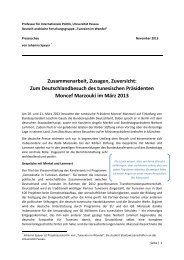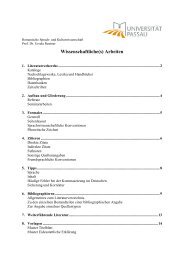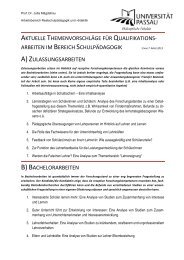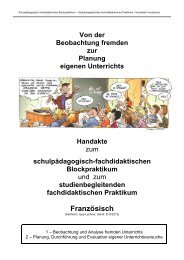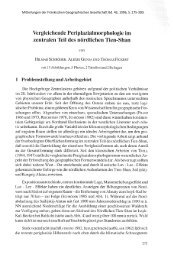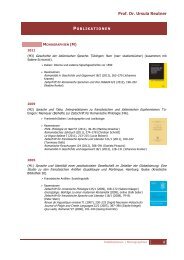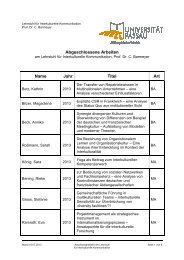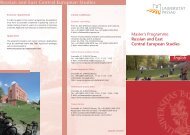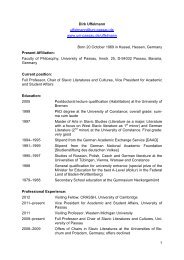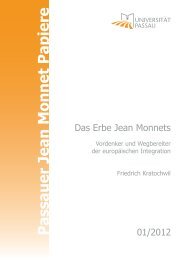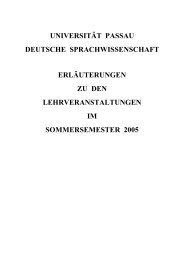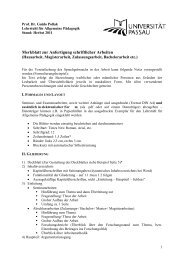The attempt to adopt a mixed-member proportional election system ...
The attempt to adopt a mixed-member proportional election system ...
The attempt to adopt a mixed-member proportional election system ...
Create successful ePaper yourself
Turn your PDF publications into a flip-book with our unique Google optimized e-Paper software.
53<br />
Mektrairat, in supporting a modified 1997 party-list <strong>system</strong>, had claimed, “Election<br />
<strong>system</strong>s with only constituencies [plurality/majority <strong>system</strong>s] … have declined. Nobody<br />
uses them any longer. In the United Kingdom, it has been abolished already.<br />
Thus if we want only the constituency <strong>system</strong>, I think that this is not in harmony with<br />
the modern world. It is also not democratic” (ibid., p. 10). At the time he spoke these<br />
words, Nakharin was the dean of the faculty of political science of Thammasat University.<br />
8 <strong>The</strong> quote is on page 23 of Reynolds, Reilly, and Ellis (2005), while the table follows<br />
on page 24.<br />
9 For an overview of elec<strong>to</strong>ral provisions in Thailand that includes the changes made<br />
by the 1997 constitution, see Nelson (2001).<br />
10 For observations on a set of such public hearings conducted in Chachoengsao province,<br />
see Nelson (2007).<br />
11 <strong>The</strong>se twelve organizations were the National Security Council (the coup plotters),<br />
the National Assembly, the Cabinet, the Supreme Court, <strong>The</strong> Supreme Administrative<br />
Court, <strong>The</strong> Election Commission, the National Counter Corruption Commission, <strong>The</strong><br />
Audi<strong>to</strong>r-General of the State Audit Commission, <strong>The</strong> Ombudsmen, the National Economic<br />
and Social Advisory Council, and the institutions of higher education. This<br />
procedure was stipulated in the Interim Constitution.<br />
12 During his time on the CDC, Jaran was permanent secretary of the ministry of justice.<br />
Previously, he had served as a secretary <strong>to</strong> the Supreme Court President. He was<br />
an avowed enemy of Thaksin, and defender of the coup. In the crisis following the<br />
<strong>election</strong> of April 2006, stretching the constitution, he said, the “EC should resign for<br />
the sake of the country. <strong>The</strong>ir resignation will allow the judicial authorities <strong>to</strong> supervise<br />
new <strong>election</strong> and recruit new EC <strong>member</strong>s” (<strong>The</strong> Nation, May 9, 2006). After the<br />
coup period had ended, he was appointed <strong>to</strong> the Constitutional Court, thereby creating<br />
a conflict of interest.<br />
13 Krirkkiat was a retired civil servant. He used <strong>to</strong> be a full professor of economics at<br />
Thammasat University, and a <strong>member</strong> of the first post-1997 National Counter Corruption<br />
Commission. He already participated in constitution drafting exercises in 1991<br />
(after the coup by the so-called “National Peacekeeping Council,” NPKC), and 1997.<br />
This indicates how well connected Krirkkiat was in the Bangkok establishment, and<br />
his degree of seniority. Moreover, he was a former rec<strong>to</strong>r of Thammasat University.<br />
14 As far as I know, no minutes were prepared of these six days of deliberations. Judging<br />
from the minutes, the CDC’s 13th meeting <strong>to</strong>ok place on March 1, while the subsequent<br />
14th meeting only followed on March 13.<br />
15 It would be interesting <strong>to</strong> draw up charts showing the networks of people from outside<br />
the CDC and CDA reaching in<strong>to</strong> these two bodies, providing back up, information,<br />
and support services, and thereby exerting influence on the drafting of the 2007<br />
constitution. However, this cannot be gleaned from the minutes of formal meetings.<br />
16 In an informal talk with the author, Kittisak confirmed his participation.<br />
17 See ปริญญา (2550a [2007]; see also ปริญญา 2007b).<br />
18 Pisit was a former spokesperson of the National Bank of Thailand. He served as<br />
deputy finance minister in the second Chuan government (1997-2001). At the time of



